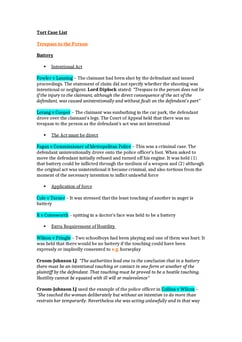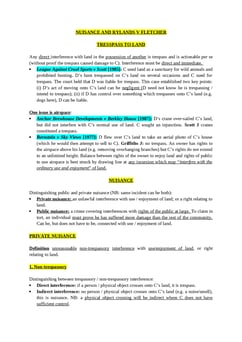Lister v Hesley Hall Ltd [2001] 2 All ER 769
Judgement for the case Lister v Hesley Hall Ltd
Table Of Contents
KEY POINTS
“Vicarious liability is legal responsibility imposed on an employer, although he is himself free from blame, for a tort committed by his employee in the course of his employment.” (Lord Steyn, [14])
-
An employer may be held vicariously liable for the unauthorised, intentional wrongdoing committed by an employee, provided that there is a connection between the wrongdoing and the nature of the work for which the employee was employed.
Since the warden's scope of work includes supervising the students, there is a link between the wrongful act committed and his employment, thereby rendering the employer vicariously liable for his actions.
FACTS
Appellants were students who resided at Aceholme House, a boarding annex in Doncaster, between 1979 and 1982 when they were aged 12 to 15 years old. The said boarding annex and the school were owned and managed by the respondent, Hesley Hall Ltd, as a commercial enterprise.
The company employed Mr and Mrs Grain as warden and housekeeper. The warden’s duties included supervising the boys when they were not at school.
Unbeknownst to Hesley Hall Ltd, the warden systemically sexually abused the appellants. Sometime in 1982, the warden and his wife left the employ of Hesley Hall Ltd. Thereafter, a police investigation led to the arrest of the warden and his subsequent imprisonment.
In 1997, the appellants brought claims for personal injury against the warden’s employer on the ground of vicarious liability.
JUDGEMENT
Appeal allowed.
COMMENTARY
This case clarified and expanded the concept of vicarious liability, making it more responsive to modern employment scenarios where employees may commit intentional wrongs for their own benefit. It underscored the importance of examining the connection between the wrongful act and the employment relationship.
The notion of "scope of employment" is pivotal. If the wrongful act falls within the range of tasks or duties that the employee was employed to perform, it increases the likelihood of vicarious liability.
ORIGINAL ANALYSIS
Plaintiffs boarded at a school where the warden, W, employed to look after them sexually abused them, unbeknown to the school, Defendant.
HL held that Defendant was vicariously liable, since there was a close enough connection between the job Defendant employed W to do and the acts he committed for him to be regarded as having acted within the course of his employment.
Lord Steyn
The policy tensions are between on the one hand compensating those from the funds of the financially responsible party and on the other hand avoiding unduly burdening businesses.
He criticises the 2-step approach of Lord Ackner (above) since it creates bizarre results, e.g. if a bank clerk defrauds customers by only giving them half the foreign currency they are due, the bank will not be liable provided the fraud is not part of the course of business.
-
Instead he says the correct approach is to examine the “connection between the nature of the employment and the tort of the employee” and hence whether it would be “fair and just” to make the employer vicariously liable.
Here there was a very close connection between the employment of the warden and the tort that he committed.
A broad approach should be taken to determining the “course of employment”. Thus an act done in self-interest can also be within the course of business.
For Further Study on Lister v Hesley Hall Ltd
Need instant answers? Our AI exam tutor is here to help.
Ask questions 🙋 Get answers 📔 It's simple 👁️👄👁️
Our AI is educated by the highest scoring students across all subjects and schools. Join hundreds of your peers today.
Get StartedSimilar Cases
Related Product Samples
These product samples contain the same concepts we cover in this case.
| GDL Tort Law | Employer's Liability Notes (10 pages) |
| Tort Law | Vicarious Liability Notes (17 pages) |


